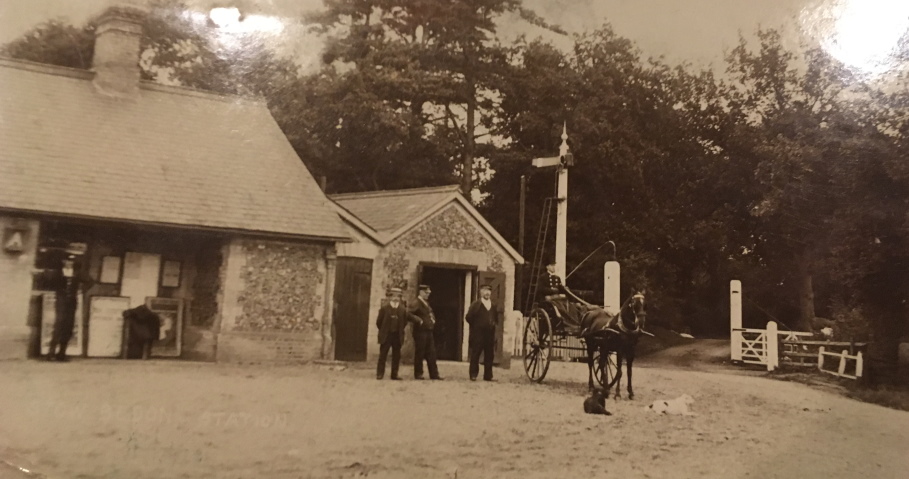
Possibly Wretham or Great Hockham Railway Station. Postcard Addison/Divita Family Collection
Court Case
At a Petty Sessions at East Harling held in May 1847, Samuel Warren of Great Ellingham was convicted of attempting to defraud the Norfolk Railway Company on the 6th May in that he had travelled in a carriage of a higher class than the ticket he had purchased.
The report of the case appearing in the Norwich Mercury of 15th May, gave no further details about the case or the defendant.
Letters to the Editor of the Norwich Mercury
However it is clear from correspondence to the Editor of the Norwich Mercury written after the case, that despite being convicted of the offence, Samuel Warren maintained his innocence. The correspondence also provides details of the alleged offence. Samuel Warren’s journey was from Cambridge to Attleburgh (Attleborough).
Mr I O Taylor of St Giles Norwich represented the Norfolk Railway Company. In a letter to the Editor published in the Norwich Mercury on May 28th, 1847, Mr Taylor referred to Samuel Warren’s letter “in last week’s paper”. Taylor referred to the fact that Warren had said that he “found himself thrust into the first class carriage with a second class ticket.” Taylor’s response was that “If he (Warren) had offered to pay the additional fare either at Brandon or Attleburgh, neither Eastern Counties nor the Norfolk Company would have had the right to complain.”
In his letter, Taylor goes on to say that the Magistrates “were satisfied that he never contemplated pursuing this course“. Taylor also said that on the arrival of the train at Brandon, Warren was seated in the first class carriage. He also said that Warren was standing against the door of the second class carriage with a foot on the step as if he was getting in, when the Porter examined his ticket. Just as the train was about to leave, Warren was observed resuming his place in the first class carriage. Warren was asked to produce his ticket (presumably during the journey) which it was said he refused to do and he continued his journey in the first class carriage.
On arrival at Attleburgh, Samuel Warren “delivered up his ticket on the platform without offering to pay additional fare.”
Mr Taylor also stated that the facts of the case were proved both at Mundford and the following day at East Harling. On both occasions, Samuel Warren was convicted of the intention to defraud both the Eastern Counties and the Norfolk Company with full penalty in each case.
In relation to Warren’s non-appearance before the Magistrates (it was said that Warren had sent a medical certifiate), Taylor stated that Warren’s disposition “did not prevent him (Warren) from going to London the previous day…” and that Warren had attended Attleburgh market on the same day as the hearing at East Harling.
In response, Samuel Warren wrote to the Editor of the Norwich Mercury, again maintaining his innocence. Warren acknowledged that Mr Taylor was “a more powerful advocate than myself” and he gave him credit for being “very desirous, as most lawyers are, of making the best of any case” but that he (Warren) “will not allow that gentleman to be equitably entitled to the ground he endeavours to maintain.”
Warren went on to say that “far from attempting to deceive the porter at Brandon, when he asked to see my ticket while I was in the first class carriage, I actually told him I was a second class passenger.” Warren added that this conversation took place in the presence of two witnesses – Mr George Burlingham and R S Watling,
Samuel Warren concluded his letter saying that “Mr Taylor may, in his professional capacity, content himself by evidence on this side, I am equally content with that on mine, and fearlessly leave the case in the hands of the public, feeling satisfied that they will be able to discriminate between correct and incorrect, probable and improbable, circumstances.”
Who was Samuel Warren?
The 1851 census captures two men named Samuel Warren living in Great Ellingham:
50 year old farm labourer, Samuel Warren, living with his wife Catherine and two children at Town Green and 56 year old farmer and employer of six labourers at Low Common with his wife Sarah Elizabeth, five children and a servant.
Given the fact that on his marriage to Catherine Briggs in 1824, labourer Samuel Warren was unable to sign the marriage register and, accordingly unlikely to be able to read and write, and also that a farmer was more likely to be travelling to London and Cambridge on business, I believe the Samuel Warren appearing before the Magistrates was Samuel Warren of Low Common and living at Tanyard Farm (referred to as Tan Farm on the 1841 census).
Sources:
Norwich Mercury 15th May 1847
Norwich Mercury 28th May 1847
Norwich Mercury 5th June 1847
Great Ellingham Parish Registers. Norfolk Record Office PD/609. Also available at FamilySearch.org https://www.familysearch.org/search/image/index?owc=4J8C-CB7%3A29627201%3Fcc%3D1416598
1841 census HO107/781/8
1851 census HO107/1823/110, HO107/1823/125